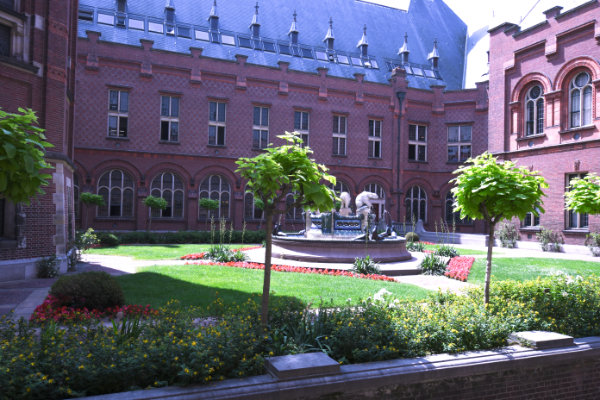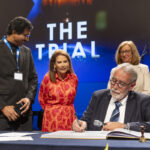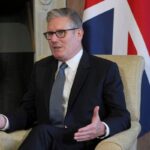Iran and its terrorist proxy, Hamas in Gaza, have turned an international court into a stage for propaganda in the best tradition of Soviet agitprop.
ICJ courtyard garden Netherlands
(Oct. 21, 2025 / JNS)
Even if U.S. President Donald Trump’s 20-point plan ends the war in Gaza, the international campaign to delegitimize Israel and cast it as a pariah state akin to apartheid South Africa will surge ahead.
The battlegrounds are familiar: worldwide media, NGOs, universities, the European Union, the International Criminal Court and the United Nations and its judicial arm, the International Court of Justice. These forums routinely portray Israel as the last vestige of Western colonialism while romanticizing Palestinians as humanity’s archetypal victims.
South Africa’s genocide case against the State of Israel before the ICJ, and joined by several state intervenors, epitomizes this ideology. Likely financed by Iran and Qatar, South Africa alleges that Israel is guilty of humanity’s greatest crime, genocide. The charge, channeling Soviet-era propaganda, has become so reflexive it might as well be a single exclamatory word: Itsagenocide. Never mind that Hamas could have stopped the fighting at a moment’s notice by releasing the hostages and relinquishing power.
The ICJ, like its parent organization, the United Nations, has a record of bias against Israel. In 2004, it issued an advisory opinion condemning Israel’s West Bank security barrier, built to stop suicide bombers, as illegal. The sole dissenter—American judge Thomas Buergenthal, a Holocaust survivor—wrote that the court ignored Israel’s right of self-defense and “never seriously examined” the impact of “repeated deadly terror attacks.”
Two decades later, amid the Gaza war, the ICJ issued another advisory opinion, this time condemning Israel’s “occupation” of the West Bank and “East Jerusalem.” Again, there was one dissenting judge—the court’s vice president, Julia Sebutinde of Uganda. Echoing Buergenthal, she warned that the advisory decision “does not reflect a balanced and impartial examination of the pertinent legal and factual questions,” and said that the court lacked “accurate, balanced and reliable information to enable it to judiciously arrive at a fair assessment … .”
Elliott Abrams, senior fellow for Middle East studies at the Council on Foreign Relations and a former U.S. national security advisor, called the ICJ opinion “vile” and “an injustice that betrays deep bias against the Jewish state.”
Unlike those nonbinding opinions, South Africa’s case, based on the 1948 Genocide Convention, ironically adopted in the wake of the Holocaust, seeks enforceable orders “to prevent and punish” Israel’s supposed genocide. The case could drag on for years before final judgment.
This is lawfare: the weaponization of legal institutions for political ends. Filed less than three months after Hamas initiated total war against Israel on Oct. 7, 2023, the genocide claim is a cynical public relations ploy designed to support the canard that Israel’s goal is to kill the people of Gaza. Well after South Africa filed the case, human-rights groups, along with intervenors, sought to broaden the definition of genocide to make it fit with actions in Gaza, implicitly confirming the genocide claim was baseless to begin with.
Nonetheless, South Africa’s scheme bore fruit early on. After an initial ICJ ruling, global headlines declared the court had found a “plausible case” Israel was committing genocide. Not so. Former president of ICJ, Joan Donoghue, went on BBC’s “HARDtalk” program and, correcting her interviewer, explained that the international court “didn’t decide the claim of genocide was plausible.”
Still, the erroneous “plausible genocide” claim had become a rallying cry for the global Itsagenocide! echo chamber.
The United States has already shown how to counter this abuse. After the ICC issued arrest warrants for Israeli Prime Minister Benjamin Netanyahu and his former defense minister, Yoav Gallant, Washington sanctioned ICC officials and warned of broader penalties if the warrants are not withdrawn. Those measures could cripple the ICC’s operations.
An analogous sanctions strategy should target South Africa’s ICJ proceeding. Rather than sanctioning the ICJ itself, the administration should press the African National Congress—South Africa’s leading party—to withdraw its complaint through targeted sanctions on the party and its leaders, including South Africa’s controversial president, Cyril Ramaphosa, who insists the case will continue despite the recent ceasefire. The ANC, financially fragile and politically weakened, could ill afford such pressure.
Were this to happen, critics would accuse Washington of attempting to politicize justice: How dare the United States twist South Africa’s arm as it supposedly seeks justice for Palestinian victims? The real question is how dare South Africa manipulate the ICJ to further Iran’s and Hamas’s war on the Jewish state? Far from upholding international law, the case weaponizes it, turning the ICJ into a stage for propaganda in the best tradition of Soviet agitprop.
With U.S. support, Israel has already shattered Iran’s “ring of fire,” crushing Hamas and Hezbollah and neutralizing Tehran’s nuclear threat. The ICJ case, like the ICC warrants, is a remnant of that campaign and should be treated as such.
Convention would allow the case to drag on for years, a judicial sword of Damocles over Israel’s head. But the Trump administration is not bound by convention. Its unconventional Middle East policy—ushering in the Abraham Accords, using force to roll back Iran’s nuclear ambitions and backing Israel in its war against Hamas—has achieved stunning results, including, remarkably, the recent return of 20 living hostages.
If convention demands that the ICJ farce continue, then convention be damned. The war against Israel still rages in Western capitals, as well as the media and corrupt U.N. institutions. Only the United States has the strength and moral clarity to stop the abuse, including imposing sanctions, however unconventional that may be.
By: Gregg Mashberg, member of the board of directors of the Institute for the Study of Global Antisemitism. Follow him on X @gregg_mashberg.
Credit of picture: Karel van Essen, ICJ courtyard garden of the UN, Peace Palace The Hague, Netherlands





